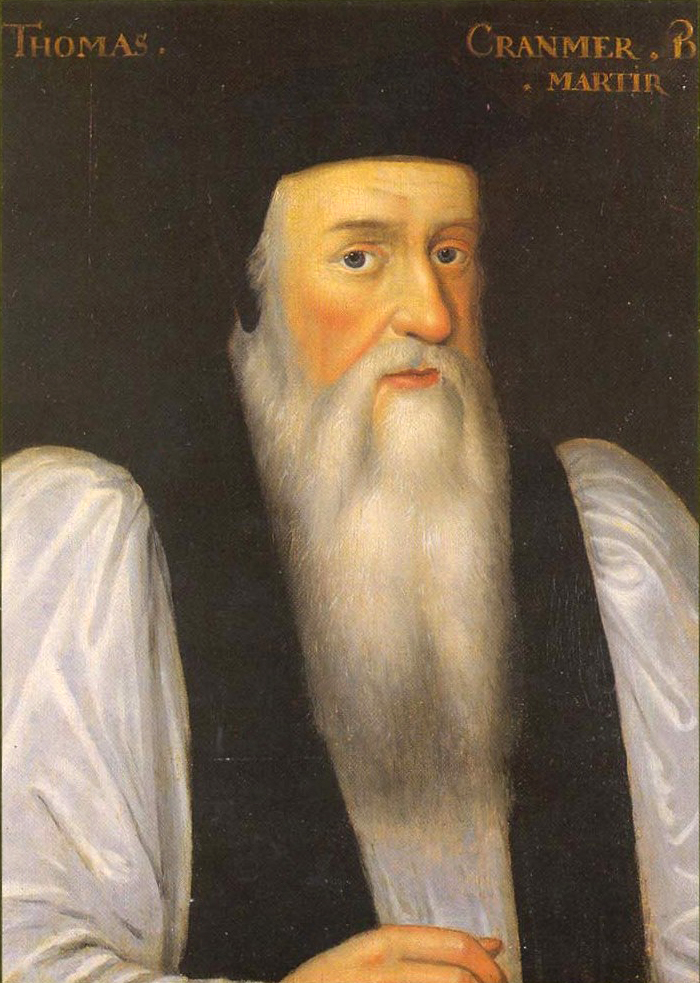
Diarmaid MacCulloch's
Thomas Cranmer is a magisterial account of the great reformer and Archbishop. I read it in my first year of uni and it gave further fuel to a passion for Reformation history that I cultivated during high school. At the end of the book, MacCulloch speculates on what might happened had the reformers program for the English church continued beyond the death of Edward VI in 1553. It's not always helpful to engage in historical speculation, but MacCulloch's work has always stirred my imagination. Here is what how he thinks history may have panned out:
"What would the Church of England have looked like if, instead of Queen Mary's triumph, Queen Jane's quite reasonable hereditary claim to the throne had succeeded in establishing her regime? The Lady Mary would have had to have been effectively neutralized before Edward's death, and one fears the neutralizing her for good would have involved the block in a return to Henrician savagery. The Lady Elizabeth could have been married off to Lord Robert Dudley, a good catch for a royal bastard, and a good chance for them both of a happy love-match. Archbishop Cranmer, living to his allotted three score years and ten or beyond, could have produced the third version of his Prayer Book, in the light of friendly criticism from Continental reformers whom he respected, like Martyr, Bullinger, and Calvin; he would have been succeeded as Archbishop by Nicholas Ridley or Robert Holgate, with energetic young reformers like Edmund Grindal ready to make their mark and pick up good ideas from the best reformed churches of Europe. John Knox , mellowed by an increasing successful career in the Church of England would have been appoint Bishop of Newcastle, benevolently taking no notice of the advanced congregations in his diocese who received communion sitting; this was a practice in any case increasingly common throughout Jane's Church, despite Archbishop Cranmer's grumbles. The reform of canon law would have been achieved, the 1553 primer and catechism would have become standard, the Forty-Two Articles would have been unmodified by Elizabethan sacramentalist hesitations.
Out in the parishes, metrical psalms in the style of Geneva would quickly have spread: these were the best secret weapon of the English Reformation, making its public worship and private devotional practice genuinely popular throughout increasing areas of the kingdom. This congregational music music would have taken over in the cathedrals, now devoid of choirs or polyphony, and with their organs (where they survived) used mainly for entertainment, in the Dutch fashion. The conservative nobility would have continued the sullen public compliance which they had shown under Edward VI, their private celebration of ceremonial worship tolerated as eccentricity, like the Lady Elizabeth's patronage of choral music in her own chapel. The traditionalist higher clergy would have died off in senior Church offices and in the universities, with no possibility of like minded replacement: since the universities, with no major haemorrhage of exiles in the 1560's, the Jesuits and other religious orders would have found it difficult to recruit potential clergy to train for their attempt to treat Jane's England as a mission field. England would have become the most powerful political player in the Reformed camp, with Cranmer a cordial if geographically distant partner with John Calvin. There is a potent symbolism in the fact that it was Cranmer's son-in-law who translated Calvin's Institutes into English, and Cranmer's veteran printer who published it. With a Cranmer-Calvin axis, the profile of Reformed religion across the whole Continent would have been changed, and with the help and encouragement from Bishop Knox, the Reformation in Scotland might have followed a close path to that in the Reformed Church of England.
That is the history that never happened." - Thomas Cranmer, Diarmaid MacCulloch, pp 618-620.
 Diarmaid MacCulloch's Thomas Cranmer is a magisterial account of the great reformer and Archbishop. I read it in my first year of uni and it gave further fuel to a passion for Reformation history that I cultivated during high school. At the end of the book, MacCulloch speculates on what might happened had the reformers program for the English church continued beyond the death of Edward VI in 1553. It's not always helpful to engage in historical speculation, but MacCulloch's work has always stirred my imagination. Here is what how he thinks history may have panned out:
Diarmaid MacCulloch's Thomas Cranmer is a magisterial account of the great reformer and Archbishop. I read it in my first year of uni and it gave further fuel to a passion for Reformation history that I cultivated during high school. At the end of the book, MacCulloch speculates on what might happened had the reformers program for the English church continued beyond the death of Edward VI in 1553. It's not always helpful to engage in historical speculation, but MacCulloch's work has always stirred my imagination. Here is what how he thinks history may have panned out:
4 comments:
Wow.
Without having read the book, a comment on this reading on its face:
The actual history is not that one-stranded, and is neither the fantasy nor the nightmare of any particular faction, either contemporary or in our own time. Why should an alternative history be more neat?
Not neater... just better music. Geneva Psalm singing! mmmmm
Nice. I'm reading this at the moment.
Ashley Null is giving a lecture on Cranmer tonight at MTC. Are you coming? Looks great.
Post a Comment